Daughters of a concentration camp survivor find each other through the Arolsen Archives

American-born Sula Miller, daughter of concentration camp survivor Mendel Müller, has spent the past five years searching for traces left by her family in war-time and post-war Europe. Documents from the archives in Arolsen provided important missing clues – and on discovering that she has a half-sister in Frankfurt, Sula traveled to Germany to meet her.
Their father survived Auschwitz and Buchenwald
It was July 2019 when Sula Miller contacted the Arolsen Archives for the first time. She was seeking information about her Jewish father Mendel Müller, who was born in 1906 in the former Austro-Hungarian Empire. He had emigrated to the USA at the end of the 1940s, where he married Sula’s mother. She came from Austria and, like him, had emigrated in the early post-war years.
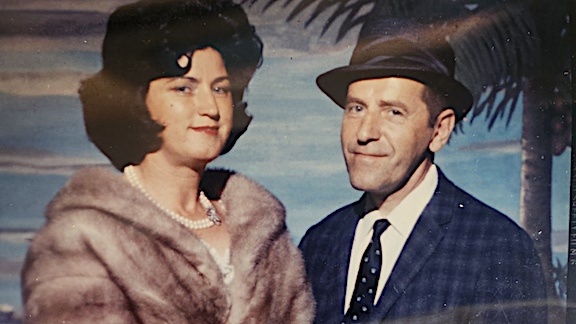
Sula’s parents in the USA, where they ran a hotel for a while (photo: Sula Miller’s private collection)
When she studied the documents, Sula found out that her father had been married to someone else before the war and that a son had been born to him in Teplice in 1932. Sula’s half-brother Max was sent to a Berlin orphanage when he was about 10 years old; shortly afterwards, he was deported to Auschwitz.
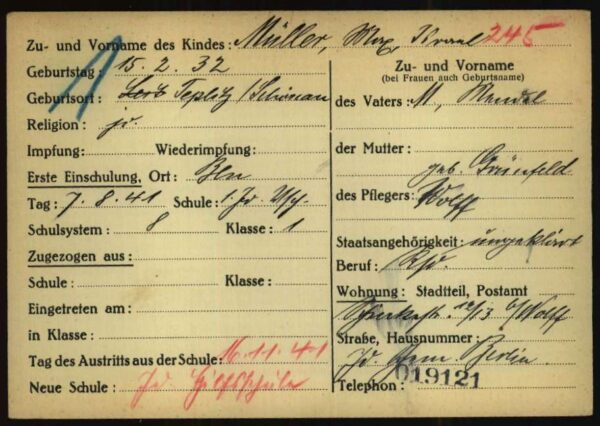
“School pupil card” issued for Max Müller in Berlin
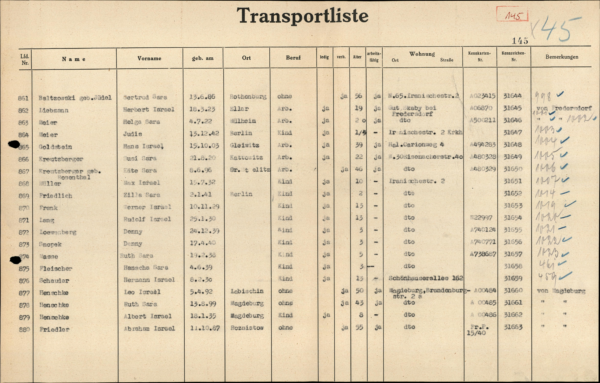
Transport list for the “30th deportation transport to the East,” which took Max to Auschwitz in February 1943.
In 1940, a daughter had been born to Mendel in what was then Hungary. This child and the child’s mother Rosa were probably murdered on arrival in Auschwitz. To this day, Sula still does not know this half-sister’s name. Sula says her greatest wish is that this child, who was murdered by the Nazis at such a young age, should not remain nameless. The Arolsen Archives are helping her with this complicated research, which involves the current Ukrainian war zone.
As well as receiving information about the persecution suffered by her father, she also found out more about his later life. The documents in the Arolsen Archives show that Mendel survived both Auschwitz and Buchenwald; he called himself Max Miller in the USA, which was the name of his murdered son; and in some documents he is also referred to as Mano Müller.
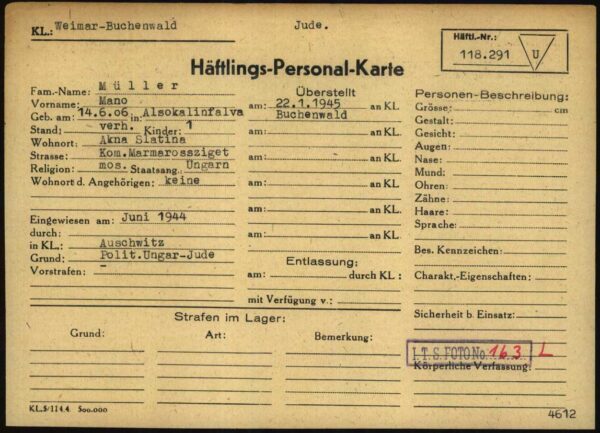
Prisoner registration card from Buchenwald concentration camp issued for Mendel/Mano Müller
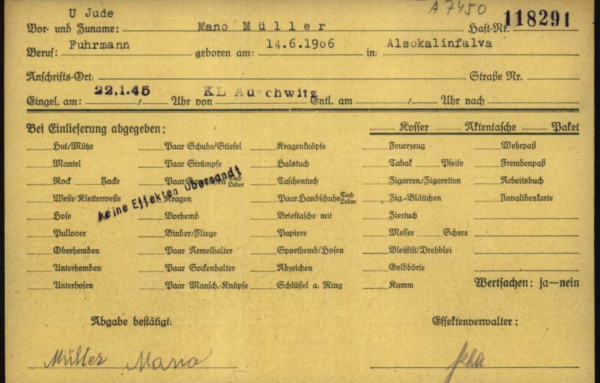
So-called personal effects card from Buchenwald concentration camp, signed by Mendel/Mano Müller.
He had to work as a forced laborer in West Germany with SS Construction Brigade III and came close to losing his life during this period. After he was liberated in Buchenwald by the Allies, he went to live in Hesse and got married again in Bad Orb in 1947. Shortly afterwards, he registered at a DP camp in Butzbach so he could emigrate to the USA.
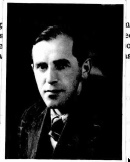
Visa photo of Mendel Müller 1947 (photo: Sula Miller’s private collection)
The Arolsen Archives also have a tracing inquiry submitted by his wife Agnes in 1951. When he emigrated to America, Mendel had left Agnes and their daughter Helen (born in 1947) behind. Sula was eager to get to know her half-sister, so in the early summer of 2023, she added Helen to her inquiry and asked the Arolsen Archives to help her find her.
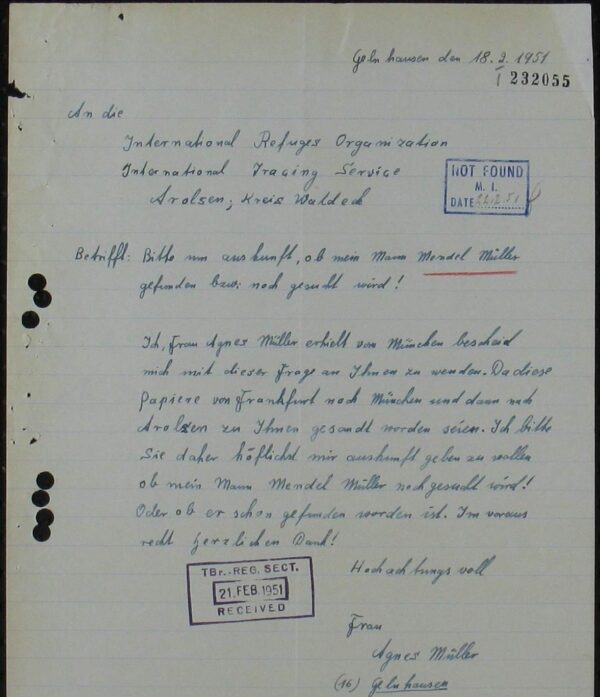
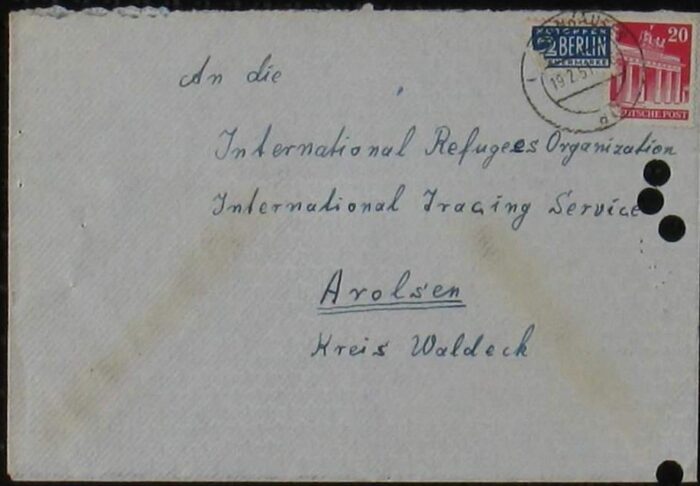
Letter from Agnes Müller to the ITS, February 1951.
In February 1951, Agnes Müller asked the ITS in Bad Arolsen to help her find her husband in the USA. She wanted a divorce. Without this letter and other documents stored in the Arolsen Archives, half-sisters Sula and Helen would probably never have known about each other.
The tracing team at the Arolsen Archives found Helen Schaller in Frankfurt am Main in late summer 2023. She was very happy for the Arolsen Archives to put her in touch with her half-sister in the USA. Helen Schaller and her two children Christa and Thomas also received copies of the documents stored in the Arolsen Archives detailing the persecution their father/grandfather suffered at the hands of the Nazis.
Half-sisters born after the war meet at last

Helen Schaller and Sula Miller at the Jewish Museum Frankfurt. Photo: Arolsen Archives
The two half-sisters began to get to know each other – on Zoom at first. They met in person for the first time in Frankfurt in June 2024.
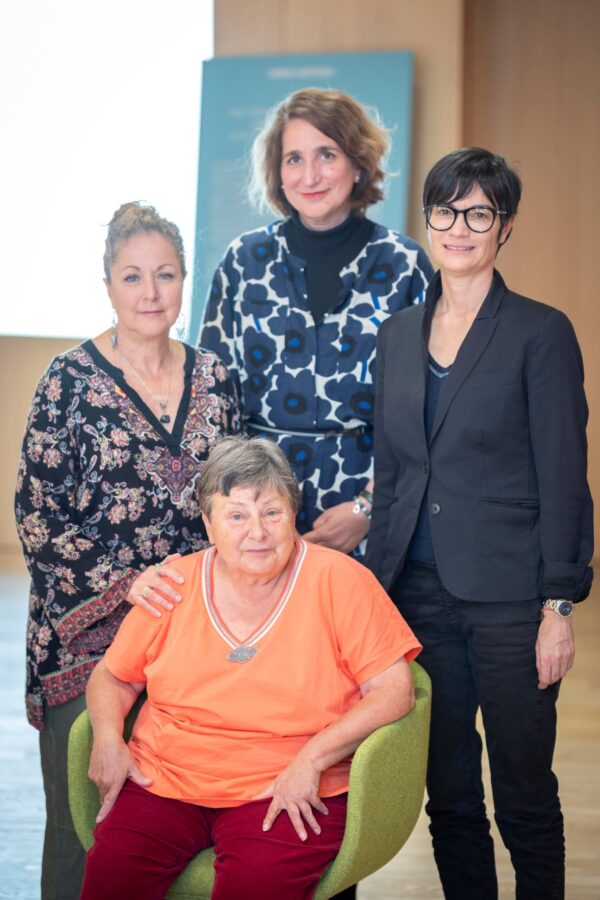
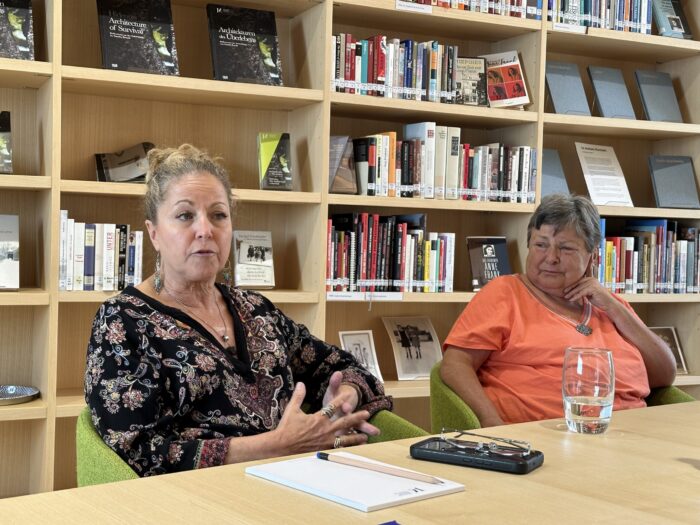
Sula and Helen tell their story at the Jewish Museum
Mirjam Wenzel, Director of the Jewish Museum, and Floriane Azoulay, Director of the Arolsen Archives, were moved by the story the half-sisters told, which revealed how the effects of Nazi persecution continue to reverberate in the lives of the post-war generation to this day.
On June 12, 2024, the Jewish Museum Frankfurt provided both women with the opportunity to speak about their family history at greater length. Sula describes her father as mentally ill and severely traumatized – always running away from something and unable to maintain relationships. Sometimes he would turn violent and shout “Hitler” and “Eichmann.” Sula believes that she is one of many people who suffer from transgenerational trauma, a term that refers to the subconscious transmission of traumatic experiences passed down to the next generation from parents who have experienced violent events, such as war or the Holocaust. When she first found out about her half-sister Helen, she was worried that she might have similar emotional scars. Sula wanted to ease her half-sister’s mind by telling Helen the truth about her father’s life and letting her know that she was not the only child left behind.
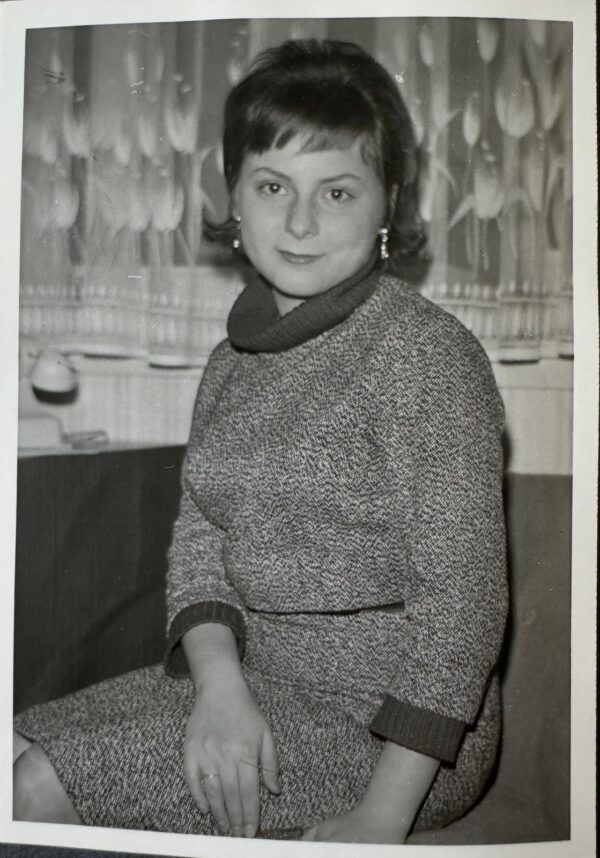
Helen Schaller as a young woman (photo: the Schaller family’s private collection)
But Helen Schaller had a happy childhood. She barely knew her biological father. Shortly after she was married – she was twenty years old at the time – Mendel suddenly turned up at her house one day. There was an argument, and he soon disappeared again. In contrast, Helen’s stepfather was a loving presence throughout her childhood. But one thing the two women have in common is their Jewish-Catholic ancestry. Both mothers were Catholic, and as children, both daughters experienced hostile attitudes towards their Jewish heritage in Germany and Austria. Sula’s experience was further complicated by rejection from the Orthodox Jewish community Mendel belonged to in the USA. They refused to accept Sula because, as the daughter of a Catholic mother, she was not considered Jewish.
Half-sisters Sula Miller and Helen Schaller are very grateful that they have found each other and that they can tell their story. According to Sula, what remains is the long shadow of inherited trauma and the realization that people’s lives can be so deeply scarred by war and violence: “With the help of all the archives, especially the Arolsen Archives, I am finally able to understand all the trauma my parents went through and therefore recognize the effect it had on me. If anything, I have found peace and forgiveness through it all.” But most of all Sula says she finds solace in the fact that people from very different backgrounds can come together and be family.

